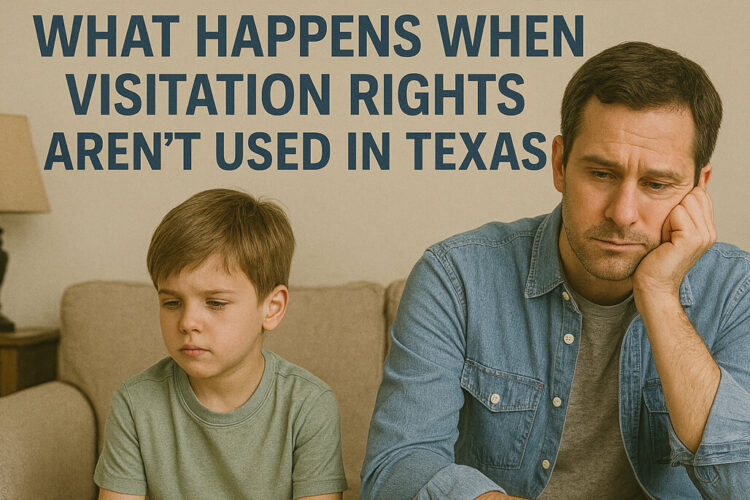When a Parent Doesn’t Use Their Visitation Time
Can missed visitation affect custody in Texas? Yes, it can.
Texas law doesn’t force a parent to use their visitation time. However, courts do pay attention when they don’t. If one parent consistently fails to show up for their scheduled visits, it can lead to custody changes, limited access, or other consequences designed to protect the child’s emotional well-being.
Your child deserves reliability. And if you’re the parent left picking up the pieces, you’re not without options.
This article breaks down what non-exercised visitation means under Texas law, how it can impact custody and court orders, and what you can do when the other parent repeatedly doesn’t show up.
What Does Texas Law Say About Visitation Rights?
Under Texas law, visitation is referred to as “possession and access,” while custody is called “conservatorship.” A parent with court-ordered visitation has the legal right to spend time with their child during designated periods. However, there is no legal requirement that a parent must exercise their visitation.
That means a non-custodial parent who regularly skips visits won’t face legal penalties just for not showing up. The courts won’t automatically revoke rights or change the schedule without a formal request.
Still, consistency matters. A pattern of missed visits can affect future court decisions, especially if the child’s emotional well-being is impacted.
Why Do Parents Fail to Exercise Visitation?
Parents may miss visits for a variety of reasons:
- Work obligations or scheduling conflicts.
- Long-distance parenting or transportation issues.
- Emotional conflict with the other parent.
- A lack of interest or disengagement.
Occasional missed visits may be unavoidable. But when it becomes a pattern, the courts start to take notice. Chronic no-shows may suggest instability, a lack of commitment, or an inability to prioritize the child’s needs.
If a parent routinely misses visitation without good cause, it can become part of the evidence in a custody modification case.
What is the Impact on Custody Modifications?
Texas Family Code § 156.101 allows for custody or visitation modifications when there has been a material and substantial change in circumstances.
Repeated failure to exercise visitation is one such change. A parent who doesn’t follow through with court-ordered visits may:
- Lose certain rights or access.
- Have their visitation reduced or made conditional. For example, supervised visits.
- Trigger a shift in primary conservatorship to the more stable parent.
The court’s priority is always the child’s best interest. If one parent is unreliable or creates emotional disruption by frequently canceling, that can justify changes to protect the child’s routine and mental health.
Emotional and Legal Impact on the Child
Children notice when a parent doesn’t show up. Over time, missed visits can lead to:
- Feelings of rejection, confusion, or abandonment.
- Increased loyalty conflicts or anxiety.
- A breakdown in the parent-child bond.
Judges understand the importance of consistency and emotional safety. They look at each parent’s efforts to maintain a healthy relationship and provide a stable environment.
If the court believes that missed visitation is harming the child, it may order counseling, limit access, or alter the schedule to reduce stress.
What Can the Custodial Parent Can Do?
If the other parent regularly skips visits, the custodial parent isn’t powerless. Here are proactive steps to consider:
- Keep detailed records. Log each missed visit, including dates, times, and any communication attempts.
- Maintain respectful communication. Avoid accusations. Instead, document and express your concerns appropriately.
- Focus on the child’s needs. Reassure them without criticizing the absent parent.
- Consult a family law attorney. Legal advice can clarify your options and help determine whether to seek a custody modification.
If non-exercised visitation creates a pattern of instability, the court may grant changes that better serve the child’s best interests.
When a Non-Exercising Parent Reappears Suddenly
It’s not uncommon for a parent who hasn’t exercised visitation in months or years to suddenly request their time again. This can be unsettling for the child and destabilizing to their routine.

- Courts often reinstate visitation gradually to ease the child into the change.
- A custodial parent can request a structured or modified schedule to support emotional adjustment.
- Reunification therapy may be recommended to help rebuild the parent-child relationship.
How Missed Visitation Affects Child Support Obligations
A common misunderstanding is that visitation and child support are legally linked. In Texas, they are not.
- A parent is still legally required to pay child support even if they miss their visitation.
- Likewise, the custodial parent cannot withhold visits due to unpaid support.
- Missed visitation may affect custody, but it has no impact on child support enforcement.
Using Reunification Therapy for Damaged Parent-Child Relationships
When visitation has been missed repeatedly, the child’s trust may be damaged. Courts may recommend reunification therapy to help heal the relationship.
- Therapy creates a safe space for the child to express feelings and rebuild trust.
- It can be court-ordered or pursued voluntarily to show commitment.
- Reunification plans are often gradual and involve both parents participating in sessions.
FAQs About Missed Visitation in Texas
Can I refuse future visits if the other parent keeps skipping?
No. You must follow the court order unless it is officially modified. Only the court can change or suspend visitation rights.
Will the court take away their rights?
Not automatically. But repeated failures may lead to reduced access or supervised visits if the child’s well-being is at risk.
Can I modify the order if they stop showing up?
Yes. You can request a modification based on a substantial change in circumstances, including chronic missed visits.
Should I tell the child about the missed visit?
Keep it age-appropriate and avoid placing blame. Focus on support and reassurance without criticizing the other parent.
What if they want to restart visits suddenly?
You must comply with the current court order unless it’s been modified. However, it’s fair to ask the court to review the schedule if reintroducing visits could affect the child’s stability.
What if the missed visits happen during holidays or special occasions?
Holidays are part of the court-ordered schedule. If the non-custodial parent regularly skips major dates, it can be documented and used in a future modification request.
Can I ask the court to make visits supervised if they keep not showing up?
Yes. If the missed visits are causing distress or confusion for the child, you can ask for supervised or conditional visitation as part of a modification.
What if my child no longer wants to go because the other parent keeps canceling?
Courts may consider the child’s reluctance, especially as they get older. However, the court order must still be followed unless modified. You can ask for an evaluation or therapy if your child is struggling.
Know Your Rights Before You React
Non-exercised visitation is frustrating and often painful, especially for children. But acting without legal guidance can backfire. Whether you’re the parent missing visits or the one left explaining the absence, the best course is to consult a Texas family law attorney.
They can help you protect your child’s well-being, uphold your legal rights, and pursue the modifications that reflect what’s truly best for your family.

